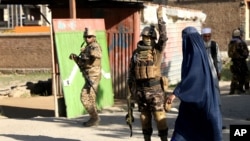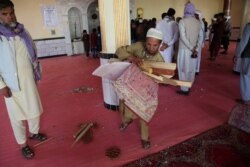Fighting between government security forces and Taliban insurgents in Afghanistan resumed in the early hours of Sunday, ending a three-day cease-fire declared by the adversaries to mark Islamic Eid al-Fitr festival.
The Afghan army confirmed its forces started “offensive, clearing and counterterrorism” operations in districts close to Lashkar Gah, the capital of southern Helmand province. It claimed the ensuing clashes killed at least 20 Taliban rebels, including a key commander.
Afghan President Ashraf Ghani spoke to his military commanders Saturday night by video conference to discuss the post-cease-fire situation.
“If the Taliban end the cease-fire and resume fighting, you must also be ready to defend your motherland and the people,” Ghani’s office quoted him as saying.
Taliban officials have not commented on post-truce insurgent operations in the country, nor on the situation in Helmand. The hotly contested province has been the scene of intense fighting since May 1, when the United States and NATO allies formally began their final troop pullout from Afghanistan.
The Eid cease-fire, which marks the end of the Muslim fasting month of Ramadan, was initiated by the Taliban and agreed to by the Afghan government. It had largely held.
However, the Afghan adversaries Sunday accused each other of committing violations and causing civilian casualties during three days of Eid festivities.
A mosque bombing in the Afghan capital, Kabul, shattered the cease-fire on Friday and killed at least 12 worshippers, including the prayer leader.
However, the Islamic State terror group took credit for that deadly attack. It also claimed responsibility for blowing up several electrical grid stations in Kabul over the weekend that had plunged large parts of the city and surrounding provinces into darkness.
Also on Friday, Taliban negotiators met with the Afghan government negotiating team in Qatar. In post-meeting statements, both sides said they had renewed commitment to start and accelerate their stalled intra-Afghan peace negotiations after the Eid holiday.
The two Afghan rivals initiated the dialogue in the Qatari capital of Doha last September as part of the U.S. push for arranging a peace deal that would end the country’s long war after international forces completely withdraw from Afghanistan by September 11.
U.S. President Joe Biden last month announced the pullout deadline, saying it was time to end the “forever war” and bring home the remaining around 2,500 U.S. soldiers. NATO has roughly 7,000 troops in the country.
The military drawdown as an outcome of a landmark agreement Washington signed with the Taliban in February 2020 to wind down the almost two-decade-long Afghan war, America’s longest.
Kabul confirmed on Friday the U.S. military had turned over a second major base to the Afghan army, noting that “the process of handing over the camps and bases” was progressing "successfully.
U.S. military officials announced last week that they had completed “between 6-12% of the entire retrograde process” and “the pace of the retrograde continues on schedule.”
Ghani has repeatedly dismissed concerns his forces would not be able to resist Taliban assaults in the absence of foreign military support and the country may again experience the civil war of the 1990s that had brought the Islamist insurgent group to power.
Neighboring China and Pakistan on Saturday again underscored “the importance of a responsible withdrawal” of foreign troops from Afghanistan.
Chinese Foreign Minister Wang Yi in a phone call with his Pakistani counterpart, Shah Mehmood Qureshi, said “the hasty withdrawal of U.S. troops from Afghanistan has severely impacted the Afghan domestic peace process and negatively affected the regional stability.”
Chinese media quoted Wang as saying that Beijing “expects the United Nations to play its due role” and stressed the need for Afghanistan’s neighbors to “speak with one voice and take coordinated actions.”

